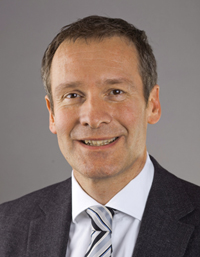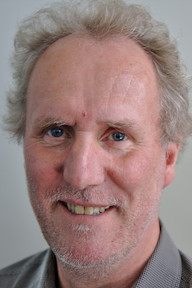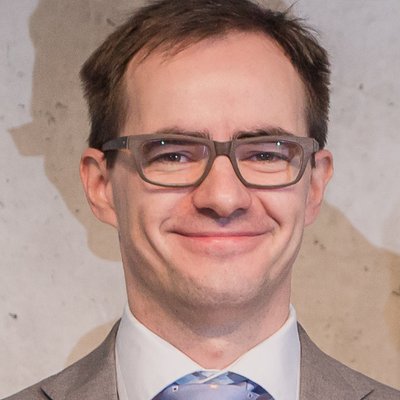Researcher Profiles
Here are just some of the world-class researchers who are a part of the UAlberta-RWTH Aachen collaborative efforts.
 |
Dr.ir. Dr.h.c., Universitätsprofessor Rik W. De Doncker Director of E.ON Energy Research Center and Institute Power Generation and Storage Systems (PGS) |
Rik De Doncker gained his doctorate in electrical engineering with the highest distinction in 1986 at the Katholieke Universiteit Leuven, Belgium. Over the following years, research grants and guest professorships took him to the University of Wisconsin in Madison as well as to the Interuniversity Microelectronic Center (IMEC) in Leuven. Further positions followed, both in industry and universities, including a position as a senior scientist at GE Corporate Research and Development Center in Schenectady/New York. He also held the position of Vice President of the Silicone Power Cooperation in Malvern/Pennsylvania.In 1996, Rik De Doncker came to the RWTH Aachen as a professor and head of the Institute for Power Electronics and Electrical Drives (ISEA). In 2006 he was appointed as director of the E.ON Energy Research Center, which is also located at the RWTH Aachen. In addition to his activities in teaching and research, Rik De Doncker carries out important functions for organisations. Among other things, he is a member of the board of directors of the Power Engineering Society within the Electrical Engineering Association (VDE). He has also held management positions in the Institute of Electrical and Electronics Engineers (IEEE) and is a member of the Executive Council of the European Power Electronics and Drives Association (EPE).
 |
Univ.-Prof. Dr. med. Stefan Jockenhövel Head of Department of Tissue Engineering & Textile Implants |
During his M.D. studies, he worked at the Dept. of Physiology, Laboratory for Extracorporeal Circulation, and developed novel oxygenator systems for paediatric lung support. In 1995, he graduated in Medicine at the RWTH Aachen University and started his clinical practice in Thoracic & Cardiovascular Surgery at the Heart Centre Baden, followed by positions at the University Hospital Aachen, the University Hospital in Zurich, and later as a senior physician at the Institute National de Chirurgie Cardiaque, Luxembourg.In 2000, he formed the Cardiovascular Tissue Engineering Group within the Clinic for Thoracic & Cardiovascular Surgery of the RWTH Aachen. Based on the knowledge gained during his research scholarships at the Dept. of Experimental Surgery, Unispital Zurich (Prof. Zund/Prof. Turina) and Dept. of Biomaterials (Prof. Hubbell) at ETH Zurich, the laboratory developed an outstanding expertise in tissue engineering of cardiovascular structures based on a fibrin gel scaffold, and the development of specific bioreactor systems for the in vitro conditioning of tissue-engineered constructs.In favour of these exciting research activities, he abandoned the clinical aspects of his career, and transferred the tissue engineering activities to the Helmholtz Institute Aachen in 2005. Since 2011 he is holding the transfaculty professorship Tissue Engineering & Textile Implants, heading the Division of Tissue Engineering & Biomaterials at the Helmholtz Institute Aachen (Medical Faculty) and the Division of Life Science & Smart Textiles at the Institut für Textiltechnik (Faculty of Mechanical Engineering) of the RWTH Aachen University.
 |
Universitätsprofessor Antonello Monti Lehrstuhl für Automation of Complex Power Systems |
Antonello Monti received his M.Sc degree (summa cum laude) and his PhD in Electrical Engineering from Politecnico di Milano, Italy in 1989 and 1994 respectively. He started his career in Ansaldo Industria and then moved in 1995 to Politecnico di Milano as Assistant Professor. In 2000 he joined the Department of Electrical Engineering of the University of South Carolina (USA) as Associate and then Full Professor. Since 2008 he is the director of the Institute for Automation of Complex Power System within the E.ON Energy Research Center at RWTH Aachen University. Dr. Monti is author or co-author of more than 300 peer-reviewed papers published in international Journals and in the proceedings of International conferences. He is a Senior Member of IEEE, Associate Editor of the IEEE System Journal, Associate Editor of IEEE Electrification Magazine, Member of the Editorial Board of the Elsevier Journal and Sustainable Energy, Grids and Networks, and member of the founding board of the Springler Journal Energy Informatics. Dr. Monti is the recipient of the 2017 IEEE Innovation in Societal Infrastructure Award.
 |
Dr.-Ing. (USA), Universitätsprofessor Stefan Pischinger Chair of Internal Combustion Engines and Institute |
Stefan Pischinger finished his mechanical engineering studies at RWTH Aachen University in 1985. Afterwards, he worked as research assistant at Sloan Automotive Laboratory, M.I.T., where he graduated as PhD in 1989. From 1989 to 1997 Professor Pischinger worked at Daimler-Benz (today: Daimler) both in the area of diesel and Otto engines. Since 1997 he is director of the Institute for Thermodynamics and head of the Institute for Combustion engines at RWTH Aachen University. At the same time, Professor Pischinger was appointed member of the board of management of FEV in Aachen in 1997; since 2003 he is president and CEO. Professor Pischinger is member of the North Rhine-Westphalian Academy of Sciences, Humanities and the Arts since 2010.
 |
Dr. med. Dipl.-Ing., Universitätsprofessor Thomas Schmitz-Rode Chairman, Applied Medical Engineering |
Schmitz-Rode received a Dipl.-Ing. degree in Mechanical Engineering from RWTH Aachen University in 1982. After working as a Design Engineer at Symbion GmbH/Inc from 1984-1986, he finished a subsequent study of Human Medicine at RWTH Aachen University with a Medical Degree in 1988.From 1989 to 2003 he worked successively as Resident, Senior Consultant, Chief Consultant of the Clinic for Diagnostic Radiology, RWTH Aachen University Hospital (Head: Professor Dr. med. Rolf W. Günther), interrupted by a Research Fellowship at Dotter Interventional Institute and Research Laboratory, Oregon Health Sciences University, Portland, OR, USA, in 1992. After receiving Habilitation in 1996 and Associate Professorship in 1999, he was appointed as a Full Professor (C3) for Experimental Diagnostic and Interventional Radiology of the Medical Faculty of RWTH Aachen University in 2003. Since 2005, Schmitz-Rode is Full Professor (C4) and director of the department of Applied Medical Engineering, which is part of the Helmholtz Institute of RWTH Aachen University.
 |
Prof. Rudolf Mathar, Dr. rer.nat. Head of the Institute for Theoretical Information Technology (TI) |
Dr. Rudolf Mathar is Pro-Rector for Research and Structure, and Head of the Institute for Theoretical Information Technology (TI) at RWTH Aachen University. In addition, Prof. Mathar is a member of the North-Rhine Westphalia Academy for Sciences and Arts; Vice-chair of the IEEE Information Theory Society Germany chapter, and chair of multiple university, faculty and research boards. He is series co-editor of "Foundations in Signal Processing, Communications and Networking", a member of the editorial board of the International Journal of Mobile Network Design and Innovation, co-founder and associate of TNC Telecommunication Network Consulting Ltd. and co-founder of Brown IPOSS Ltd.
Prior to his role as Pro-Rector, he was Dean of the Faculty of Electrical Engineering and Information Technology at RWTH Aachen University
 |
Prof. Gerhard Lakemeyer Dept. of Computer Science |
Prof. Lakemeyer is a professor of computer science and head of the knowledge-based systems group. He is also affiliated with the information systems group at RWTH Aachen. Prof. Lakemeyer's research areas are as follows: artificial intelligence, knowledge representation, and cognitive robots.
 |
Junior-Prof. Dr. med. Dr. rer. nat. |
Prof. Bzdok has studied medicine between 2006 and 2012 at RWTH Aachen University, Université de Lausanne, and Harvard Medical School, supported by the German National Merit Foundation. In 2010 he entered the world of brain imaging neuroscience working with Simon Eickhoff as part of the International Research Training Group "Schizophrenia and Autism" (DFG-IRTG1328).
By additional affiliation with the Institute of Neuroscience and Medicine 1, Research Center Jülich, he received training in neuroanatomy from Karl Zilles and Katrin Amunts. He defended a doctoral thesis in cognitive neuroscience in December 2012 ("Functional Specialization for Social Processes in the Human Brain"). This work received the Grünenthal prize his my faculty, the Friedrich-Wilhelm prize and the Borchers medal from his university, as well as the Hans-Heimann prize from the German Society of Psychiatry.
From 2013 to 2015 he then pursued a PhD in computer science on machine learning working with Bertrand Thirion and Gaël Varoquaux at INRIA Saclay & Neurospin near Paris and Heinrich-Heine University Düsseldorf ("Statistical Learning of Biological Structure in Human Brain Imaging"), supported by a PhD scholarship of the German National Merit Foundation. Since September 2015 he heads the section for "Social and Affective Neuroscience" at the Department of Psychiatry, RWTH Aachen University, as an assistant professor and he is a principal investigator in the DFG-IRTG2150 closely collaborating with the University of Pennsylvania, USA. In 2017, he was named "Rising Star" by the American Psychological Association (APS).
 |
Prof. Dr. Leif Kobbelt Head, Institute of Computer Graphics and Multimedia; Department of Computer Science |
Prof. Kobbelt is a German university professor for Computer Science with a specialization in Computer Graphics. Since 2001 he is the head of the Institute for Computer Graphics and Multimedia at RWTH Aachen University.
After receiving his diploma in 1992 and his PhD in 1994 in Computer Science from the Karlsruhe Institute of Technology he worked at the University of Wisconsin-Madison, the University of Erlangen-Nuremberg and the Max Planck Institute of Computer Science before he moved to RWTH Aachen University in 2001. Here he built up an internationally renowned research group which eventually led to the foundation of the Visual Computing Institute at RWTH in 2015.